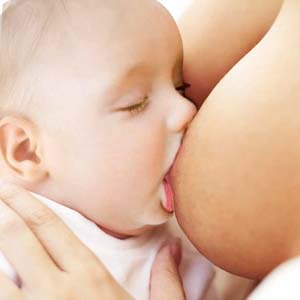Menstruation and Breastfeeding

Approximately in about 80% of women menstruation returns by ten weeks after birth if they choose not to breast feed. In women who breastfeed, menstruation is delayed for around twenty weeks or sometimes more. However, the World Health Organization considers any bleeding after fifty - six days or more post birth to be menstruation.
Breastfeeding while menstruation
If menstruation does occur while Breastfeeding, it will be different from prior periods. The menstrual flow would be heavier or lighter. The length of time the periods last may also vary. The periods may not
be regular for several months as the body works to regulate itself after
childbirth.
Menstruation does not imply that one has to quit breastfeeding. They milk supply may slightly decrease and the child has to be compensated by nursing more often. Any supply issue has to be discussed with the doctor who would recommend any need for help during this time.
Contrary to popular belief, breast milk will not taste differently or lose its nutritional value in any way even when the mother is menstruating. There may be a slight decrease in the mother's milk production and supply during the menstrual days but once the period subsides, the hormone level will return to normal and so will milk production and supply. But some opine that although milk does not sour as such, the baby might notice a slight difference and may not eat well during the period.
Lactational Amenorrhea
There are women in whom menstruation does not occur even for a full year or more while breast feeding.
This is called 'lactational amenorrhea'. Breast feeding is used as an exclusive
form of birth control by some mothers, called lactational amenorrhea method,
LAM. If performed correctly, this method can be quite effective in birth
control. But many women may find this method uncomfortable due to frequency of
nursing for long periods. Doctors normally recommend another method in addition
to LAM.
Menstruation while breastfeeding
Normally breastfeeding mothers do experience menstrual suppression in varied degrees. Breastfeeding is known to delay ovulation and in some women menstrual periods would occur several weeks or months or even years later. Among several other factors, the decrease of the stimulation of the mother's breast especially during nights can prompt the occurrence of menstruation and the start of ovulation.
Return of menstruation after child birth
Menstruation is likely to return once the baby begins to sleep for longer durations at night. If the mother begins to
supplement the baby with solid foods, menstruation might occur.
Menstruation is likely to be irregular and it would take some time before it becomes regular. During breastfeeding, the tendency is to have either shorter or longer menstrual periods. Occasionally skipping of periods for several months can be seen. These issues of course vary from one woman to another.
Breast milk supply
The baby has to be nursed at least every two hours
each day and once in three hours at night. Frequent breast feeding sessions for
the baby will stimulate the production of breast milk.
Many women complain about nipple tenderness which is a common problem on return of menstruation. This occurs before, during or after menstrual periods. Tenderness in nipple does make it difficult for mothers to breast feed their babies. They refuse to breast feed their babies which often causes the child to be left hungry.
Applying hot compress on the breasts could relieve soreness before breastfeeding. Allowing the nipple to dry after every feeding may also help as soreness can worsen if it is left wet.
Breastfeed and cancer
Researchers opine that women who breast feed for at least two years minimize the risk of developing cancer nearly half compared with women who breast feed for less than six months. The protective effect of
breastfeeding can be seen in women before and after menopause. The longer
duration of lactation significantly reduced risk of breast cancer.
Anything can be considered normal when it comes to menstruation and breastfeeding. While some mothers do get their periods when the baby is only two to three months old, there are others who do not get their menstrual periods back until they wean the baby. Much depends on how sensitive the mother is and the hormonal influences of breast feeding.
Top of the Page: Menstruation and Breastfeeding
Tags:#menstruation and breastfeeding

Inserting Tampon
Pre Menstrual Syndrome Symptom
Painful Menstrual Cramps
Prolonged Menstruation
Menstrual Regulation
Menstruation after Birth
Menstrual Cup
Menstruation and Breastfeeding
Dysfunctional Uterine Bleeding
Breakthrough Bleeding
Uterine Fibroid Embolization
Vaginal Bleeding After Menopause
Menopause Symptom
Hormone Replacement Therapy
Black Cohosh
Pelvic Inflammatory Disease
Top of the Page: Menstruation and Breastfeeding
Popularity Index: 100,783

